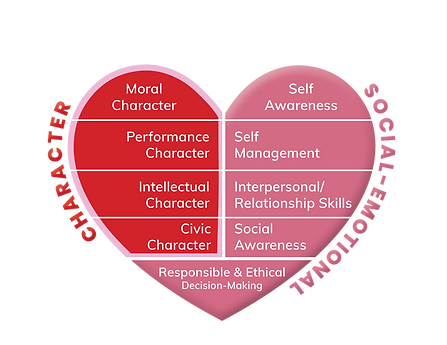
It's the age old question:
Who are you and who do
you want to become?

What We Do
CITRS designs and implements K-12 character initiatives that empower educators to create nurturing and safe environments for their students. At CITRS, we believe that every child deserves equal access to the absolute best character-centered programs, whether in a public, private, or home school environment.
"INTELLIGENCE PLUS CHARACTER,
THAT IS THE GOAL OF TRUE EDUCATION."
Martin Luther King Jr.
What is Character?
Simply speaking, character is who you are, not what you've achieved. More formally, character is the aggregate pattern of behavior, decisions, and actions that become habit over a person's lifetime. For the purpose of designing school-based character initiatives, CITRS maintains the following:
-
Character is based on many character strengths, such as honesty, empathy, kindness, perseverance, and respect.
Simply speaking, character is who you are, not what you've achieved. More formally, character is the aggregate pattern of behavior, decisions, and actions that become habit over a person's lifetime. For the purpose of designing school-based character initiatives, CITRS maintains the following:
-
Character is based on many character strengths, such as honesty, empathy, kindness, perseverance, and respect.
Simply speaking, character is who you are, not what you've achieved. More formally, character is the aggregate pattern of behavior, decisions, and actions that become habit over a person's lifetime. For the purpose of designing school-based character initiatives, CITRS maintains the following:
-
Character is based on many character strengths, such as honesty, empathy, kindness, perseverance, and respect.
Simply speaking, character is who you are, not what you've achieved. More formally, character is the aggregate pattern of behavior, decisions, and actions that become habit over a person's lifetime. For the purpose of designing school-based character initiatives, CITRS maintains the following:
-
Character is based on many character strengths, such as honesty, empathy, kindness, perseverance, and respect.
-
Character cannot be imposed; it can only be developed.
-
Character is unique to each individual.
-
Character is a lifelong journey that evolves over time.
The word character is derived from the Greek word charaktēr, meaning
"mark or distinctive quality."
DID YOU KNOW
For some, the word “character” conjures questions or concerns about whether school-based initiatives might seek to impose certain morals or beliefs onto students. To be clear, our initiatives are non-partisan and non-sectarian and serve only to explore our common humanity.
What is Character Development?
Character Development is a comprehensive and holistic approach to helping children understand, care about and consistently practice character strengths that will support students in school, relationships, and the workplace.
Character Development is best understood through the framework of the CSED (Character and Social Emotional Development) National Guidelines featured below:
Comprised of nine areas, the CSED guidelines don’t just add a character piece to many existing SEL (Social Emotional Learning) programs, but fuse together character and social emotional learning into one comprehensive and unified framework that supports, nurtures, and fosters the whole child.

At CITRS, we have identified 185 Character Strengths that contribute to one’s character. For anyone new to the field of character development, it’s often helpful to share the breadth and depth of the vocabulary used to define what we mean when we simply say, “character.” As you can see from the list below, it isn’t quite so simple!

Our Goal for True Success
The problem with "success" as we know it
There are many difficult challenges facing young people today—from anxiety to bullying, cheating, school safety and drug addiction. Compounding these challenges are the societal pressures to attain "me-centered" achievements, such as more money, fame, and popularity. From a very young age, the expectation for "me-centered" achievement is also ingrained in our educational systems where grades and test scores dominate student assessments. When we prioritize these achievements at the expense of our character and "other-centered" achievements, our lives become unbalanced, and ultimately "true success" is often elusive.
"True success" is what we need
True success in life requires a balance between both "me-centered" and "other-centered" achievements. These "other-centered" achievements include our role as a parent, a friend, a colleague, or member of our local, state, and national communities. In recent years educators, policymakers, scholars, scientists and foundations are increasing recommending "other-centered" programs for schools. New frameworks have emerged to help establish new standards and guidelines. Of course, with more frameworks, come more programs to evaluate! CITRS is poised to collaborate with school leaders to design comprehensive programs that meet these new standards to create a sustainable, character-centered school culture. It's a lot to figure out, but we are here to help.
True Success is Achieved When There is a Balance Between
"Me-Centered" and "Other-Centered" Achievements

